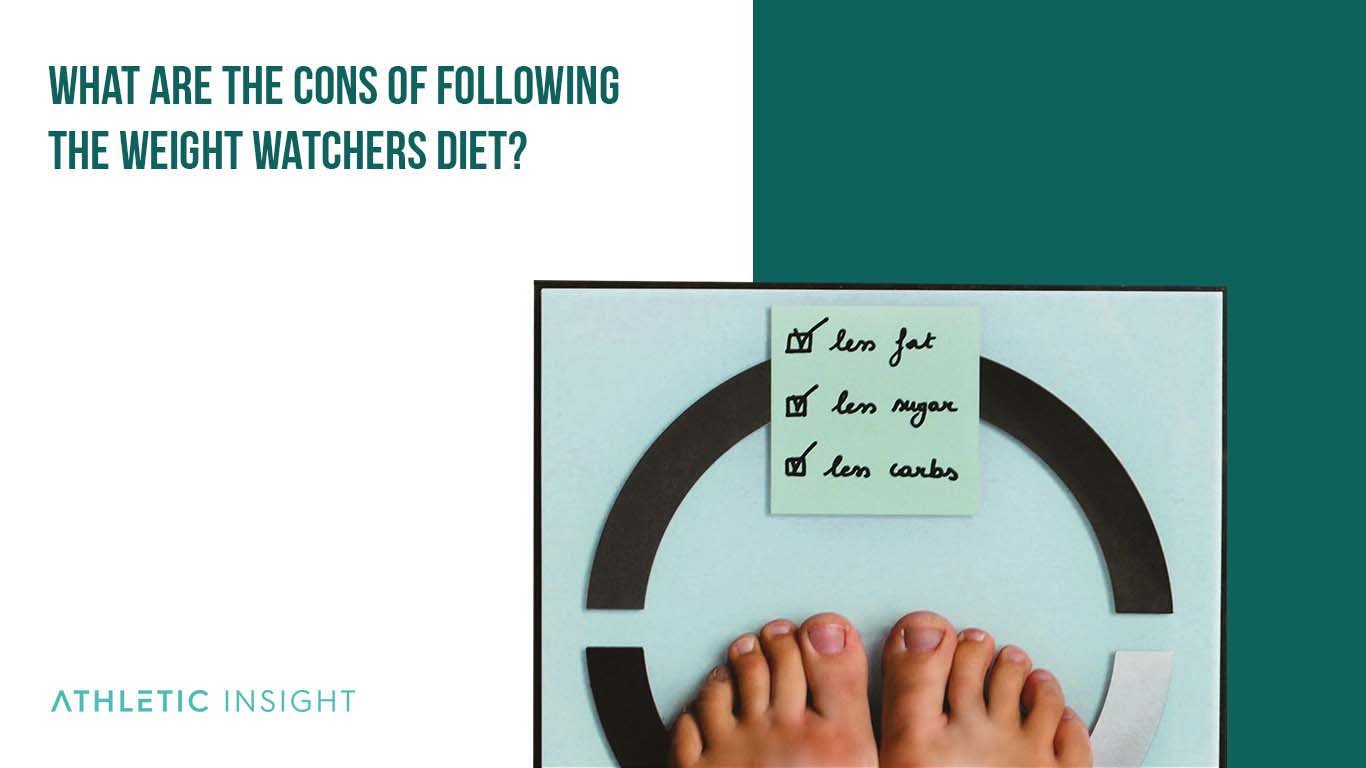Nutrition is something that people have debated for many years. Even the experts disagree on major nutritional findings. As much as we’d like for it to be black and white, diet and nutrition are entirely gray.
Each year, there are countless new types of diets and dieting fads that pop up. It can be hard to figure out if those diets are suitable for you until you give them a fair shot, but with many diets out there, you need to find a way to narrow down the ones worth trying.
The Weight Watchers diet is a diet that is effective at controlling high blood pressure and heart risks by focusing on nutritious and low-calorie food.
Keep reading to find out the pros and cons of Weight Watchers to see if it meets your standards and is worth trying.
What are the Benefits of Following the Weight Watchers Diet?
First, let’s look at the benefits you can enjoy when following the Weight Watchers diet to answer “why to join Weight Watchers?”

A Weight Watchers diet has many benefits and is defined by healthy foods low in calories.
1. Weight Watchers Diet is Flexible and Balanced
Weight Watchers is considered one of the best diets for weight loss because of how flexible it can be.
Weight Watchers uses points to swap between foods and select whatever portions you want. You are not restricted to a specific regiment where one-size-fits-all. You can customize your diet to your individual ability and needs.
This fact makes Weight Watchers the ultimate do-it-yourself-free diet.
2. Weight Watchers Diet Can Teach Lifelong Skills
Many diets are temporary measures to get you to improve your habits or set yourself up in a better place to form better habits.
Weight Watchers is different in that it teaches you skills in tracking your food intake that you will use for the rest of your life. A person’s ability to track their food intake is a predicting factor for their ability to gain weight loss success.
3. No Foods Are Forbidden in Weight Watchers Diet
As previously mentioned, Weight Watchers uses a points system for tracking which foods you can eat and at what portion you can eat them.
With this system, you can still eat any foods that you want. No foods are off-limits as long as you can fit them into your points system.
The points system teaches you to consider trade-offs and negotiation to get yourself to stay within your limits and helps you think twice before mindlessly snacking on whatever is nearby.
4. Weight Watchers Diet Provides Slow and Steady Weight Loss
The Weight Watchers diet isn’t a quick fix where you are trying to drop a massive amount of weight. Weight Watchers is a slow and steady process where you are trying to lose 1-2 pounds per week safely.
The National Institute of Health uses this guideline when it is trying to recommend a safe amount of weight someone can lose without too many adverse side effects.
The goal of Weight Watchers is to slowly change your lifestyle by forming life-long habits that will keep you healthy and informed about what you are putting in your body and how it can affect you.
People need to experience weight loss slowly and must follow the best diets for weight loss because it sets the expectation that weight loss is a marathon and not a sprint. People who lose weight in rapid intervals find that it is just as easy to put the weight back on as it was to lose it.
By building up the time it takes to lose weight, the person feels a greater sense of accomplishment and inspiration to keep going with their diet.
5. There Are Lots of Resources for Weight Watchers Diet
Another great thing about Weight Watchers is the abundance of helpful resources for weight loss associated with Weight Watchers.
The support system of Weight Watchers features virtual coaches, online Weight Watcher support groups, and in-person meetups.
People who can connect with a social component of their weight loss journey see more success than people who isolate themselves.
Since Weight Watchers has been around since 1963, a veritable library of recipes and workouts is available to members who have accumulated over the years.
With a membership, you also get a barcode scanner app to help make meal tracking simple. You get an activity tracker that you can sync with your Weight Watchers app, making physical activity tracking and nutrition tracking seamless.
6. Weight Watchers Diet Can Reduce Diabetes Risk
Diabetes is a disease that results from an inability of the body to manage blood sugar levels.
People with diabetes often need medication to help regulate their body’s blood sugar. Otherwise, they can experience extremely low or extremely high levels of blood sugar, which are extremely dangerous to your health.
Apart from biological diabetes, people can also develop diabetes due to poor lifestyle choices over time.
If someone is eating an overabundance of sugary and unhealthy food, they can develop a condition called pre-diabetes. If someone with pre-diabetes continues down an unhealthy lifestyle path, their diabetes can turn into full-blown diabetes, and there is no turning back.
Weight Watchers can be a great tool in preventing your risk of developing diabetes. If you are following the point system, you will not be able to intake so much sugar that it can contribute to creating a diabetes condition.
People who have had prediabetes have lost more weight with Weight Watchers than with other diets such as those suggested by the National Diabetes Education Program.
Weight Watchers have been demonstrated to improve blood sugar levels in ways that lead to a significant reason to believe Weight Watchers can dramatically reduce your risk of Diabetes.
7. Weight Watchers Diet Promotes Exercise
Weight Watchers has resources that encourage you to pair your healthy eating with physical activity goals that you can do daily or weekly.
These goals incentivize you because exercise gives you points you can use to eat the foods you want. Once you start getting immersed in the points system, you will be scraping together points wherever you can since there are only a few points to go around each week.
The ability to add points through exercise will give you a better motivation to exercise than just the fact that it is healthy. You will also be motivated because getting points becomes fun!
What are the Cons of Following the Weight Watchers Diet?
Next, let’s look at a few downsides to Weight Watchers and examine why Weight Watchers doesn’t work for some people.

1. Weight Watchers Diet Can Be Costly
Do Weight Watchers work? Yes, but the results can be costly. There is a monthly cost when you sign up to be a member of Weight Watchers or Weight Watchers Pro.
This monthly cost also doesn’t include the lifestyle change cost regarding exercise access and food costs.
Weight Watchers has a membership for different programs that you become a member of for a set duration and constantly needs to be renewed for those periods. There are also extra fees if you decide to use any number of membership add-ons.
Membership add-ons include one-on-one coaching on your habits or workouts led by a paid instructor.
2. Counting Points Can Be Tedious in Weight Watchers Diet
Not everyone has the mental space in their lives to be constantly adding points and solving math equations.
The amount of active mental effort you have to do in the Weight Watchers diet can be strenuous or even stressful for some people, making their experience not so fun overall.
Also, sometimes things in life come up where it makes it extremely difficult to find the time to put in extra effort to maintain your diet.
Sometimes you may be in a situation where you have less control over what you eat, or you may develop a negative feeling toward food, leading to developing an eating disorder.
Suppose you are someone who has an already restricted diet because of a medical condition or religious preference.
In that case, you might find the point system challenging to contend with, leading to further discouragement about the process.
It is worth noting many people can overcome the tedious nature of counting calories until it becomes something they don’t even think about. Your mileage will vary depending on how well you adapt to the diet.
3. Weekly Weigh-Ins Are Necessary for Weight Watchers Diet
Tracking your progress is an essential part of the Weight Watchers program, and weekly weigh-ins are part of that process.
Unfortunately, weigh-ins are often associated with negative hits to self-esteem and a despairing feeling you aren’t making any progress because of the slow nature of the Weight Watchers program.
People sometimes get into a negative feedback loop where they lose faith in the program, start breaking some rules, weigh in, get further discouraged, and lose confidence until they abandon trying.
The human body’s weight will naturally fluctuate throughout the day or week by 5 pounds or more, so in a program where losing 1 pound is considered progress, you might get a false sense of progress or lack of progress that fails to keep you appropriately motivated.
4. There is Limited Evidence for Cardiovascular Benefits of the Weight Watchers Diet
The jury is still out on whether or not the science agrees that Weight Watchers has Cardiovascular benefits overall.
If you are worried about risks to your cardiovascular health like heart attacks, strokes, or other diseases, you may want to look into a diet that has a more scientifically proven track record.
5. There is Too Much Freedom in Weight Watchers Diet
Sometimes too many choices are a bad thing. When some people lack structure, they become paralyzed by the number of choices they can make and start feeling a phenomenon experts call “analysis paralysis.”
In analysis paralysis, people stress over the number of choices and make the wrong choice. In contrast, they don’t have to expend as much mental energy considering so many different options in a system with fewer choices.
Also, Weight Watchers introduces zero point foods which are free foods you can eat whenever you want and don’t count towards your point budget. These foods are often over-eaten by Weight Watch dieters because they try to save all their budget for less nutritious foods later in the day.
This zero-point cycle creates a dynamic where you are essentially starving yourself just to make it to later in the day where you can eat less than nutritious foods, defeating the incentives of getting you to eat healthier.
Some people might benefit more from a stricter, more structured diet than a flexible one like Weight Watchers.
6. Weight Watchers Diet May Lead to Unhealthy Dieting
Counting points and constantly comparing your weight stats can lead to stress for some people.
This stress can ironically contribute to a lot of stress eating among Weight Watch Dieters.
Stress eating is when someone uses food as a coping mechanism to help them feel better. This stress eating doesn’t satisfy their physical hunger, so they are much more likely to eat an overabundance of foods without realizing it.
It is essential to keep in mind that Weight Watchers is just a diet guide meant to encourage the development of healthy lifetime habits. It cannot address or fix any mental or stress issues in your life.
If you are already in an unhealthy relationship with food or sense that you may have trouble going through a negative spiral because of the program’s mental attention, you may not want to try Weight Watchers.
Set your expectations to a reasonable level, and don’t assume that a diet can fix everything, or you might just make your unhealthy eating habits worse with diet stress management.
How to Get the Most Out of Weight Watchers Diet Benefits?
To get the most out of a Weight Watchers diet, you will want to do your research and set your expectations appropriately.

Experts suggest that you drink lots of water, get good at substituting bad cravings, plan everything out ahead of time, and make the process fun.
Weight Watchers is one of the most well-documented and well-researched weight loss programs available today, so there is thankfully no shortage of research that you can do yourself to come to your conclusions about it.



